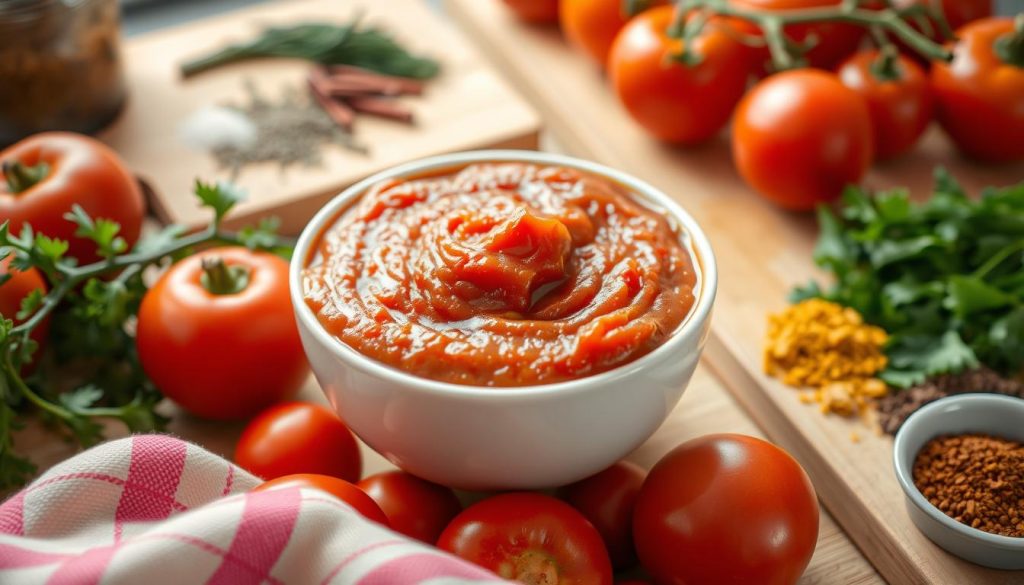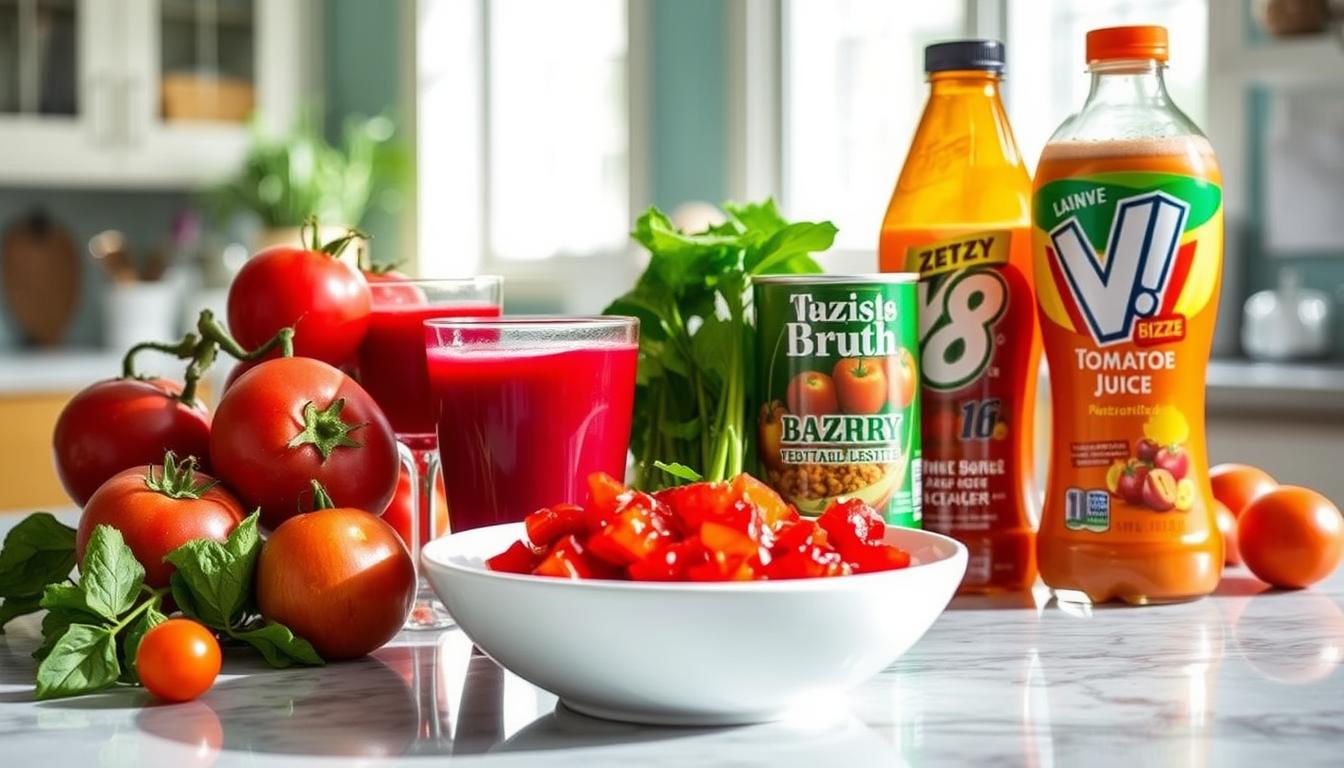Tomato juice is a key ingredient in many recipes, loved for its sweet and tangy taste. It has a long history, starting in Mexico in the 16th century. Today, tomatoes are enjoyed worldwide, with China leading the way in consumption.
While tomato juice is versatile, sometimes you might need a substitute. This guide will show you different tomato alternatives. You’ll learn about their unique tastes and textures, perfect for when you can’t use tomato juice.
Maybe you’re out of tomato juice or need to follow a special diet. Knowing how to use substitutes can make your cooking better. You’ll see how other ingredients can bring new flavors to your dishes. Let’s start this tasty journey, exploring the many options for your cooking.
Understanding Tomato Juice and Its Uses
Tomato juice is a favorite drink and cooking ingredient made from tomatoes. It’s packed with nutrients, offering many health benefits. Its taste is a mix of sweet and tangy, making it a key ingredient in many dishes. Knowing about tomato juice helps you see its value and health benefits in your meals.
What is Tomato Juice?
Tomato juice is more than a tasty drink; it’s full of vitamins and minerals. It has vitamins A, C, E, and K, folate, potassium, and antioxidants like lycopene. These nutrients make it a healthy choice. Many people like it cold or in cocktails, like the Bloody Mary.
Common Uses of Tomato Juice in Cooking
Tomato juice has many uses in cooking. It’s great for making soups and stews or adding flavor to marinades. It’s used in everything from hearty sauces to refreshing drinks. Using tomato juice in cooking can make your meals better and healthier.
| Use | Description |
|---|---|
| Base for Soups | Provides a flavorful foundation for various soup recipes. |
| Cooking Marinades | Enhances flavor in meats and vegetables. |
| Cocktails | A key ingredient for mixed drinks, offering a savory taste. |
| Fresh Beverage | Can be enjoyed solo, seasoned with spices for extra flavor. |
Why You Might Need Tomato Juice Substitutes
Knowing when to swap out tomato juice can make cooking better. Sometimes, you might run out of ingredients right when you start cooking. This can lead to emergencies, like when tomato juice is crucial in your recipe.
Learning how to handle these situations can really help. It saves your cooking efforts and keeps your meal on track.
Situations When You Run Out of Tomato Juice
It’s easy to forget some ingredients when planning meals. If you’re out of tomato juice, you don’t have to stop cooking. Having substitutes ready lets you keep going, ensuring your dish tastes great.
Being ready with alternatives is very helpful, even in urgent situations. It helps you stay on schedule and avoid delays.
Addressing Tomato Allergies or Sensitivities
Some people have tomato allergies, making some recipes hard to enjoy. For those with dietary restrictions, finding substitutes for tomato juice is essential. It helps make meals safe and welcoming for everyone.
By using alternatives, you can meet different tastes and health needs. This way, everyone can enjoy tasty meals without worrying about allergies.
Overview of Popular Tomato Juice Alternatives
Exploring different tomato juice alternatives can really boost your cooking skills. Each option has its own special traits that can either match or add to tomato juice’s taste. Knowing this helps you choose the right ingredients for your dishes.
How Each Substitute Compares to Tomato Juice
When looking at tomato juice alternatives, it’s key to see how they differ in taste and texture. Here’s a table that shows some common substitutes and what makes them unique.
| Substitute | Flavor Profiles | Texture Differences |
|---|---|---|
| Tomato Purée | Rich tomato flavor, slightly thicker | Smooth and creamy, similar viscosity |
| Red Bell Peppers | Sweet, mild flavor with lower acidity | Chunky, adds more body |
| Tamarind Paste | Sweet and tangy with umami notes | Thick paste, changes dish consistency |
| Canned Tomatoes | Fresh tomato flavor, varies by type | Varies from chunky to saucy, depending on form |
| Eggplant Purée | Earthy and slightly sweet | Thin and silky, different mouthfeel |
Flavor Profiles and Textures of Alternatives
Looking into the flavor profiles of substitutes opens up a world of choices. For example, tomato purée keeps a similar taste, but red bell peppers offer a sweeter, less acidic option. Tamarind paste adds a complex mix of sweet and tangy, enriching dishes. Also, the texture of these alternatives can change how your meal feels. Getting used to these differences can add exciting new layers to your cooking.
Substitute for Tomato Juice Guide
Looking for substitutes for tomato juice can make cooking more fun and flexible. This guide looks at three great options, each with its own taste and benefits.
Tomato Purée as a Viable Replacement
Tomato purée is a thick, tasty swap for tomato juice. It’s perfect for soups, stews, and sauces. Its strong flavor makes dishes more exciting. Use a 1:2 ratio of purée to juice in your recipes.
Exploring Red Bell Peppers for a Unique Flavor
Red bell peppers are a colorful, healthy choice instead of tomato juice. They taste sweet and are less acidic. Great for cooking with red bell peppers, they add color and nutrition to dishes.
Roasting them brings out their sweetness and adds a smoky taste. They look like tomatoes, making dishes look appealing.
Tamarind Paste: A Sweet and Tangy Option
Tamarind paste is sweet and tangy, perfect for a zesty tomato juice substitute. It’s great in Asian and Latin dishes, like curries and sauces. Start with a little, as it’s strong.

Creative and Uncommon Tomato Juice Substitutes
Looking for something different than tomato juice? Try grapes, bilimbi, and olives. They bring unique flavors and benefits to your cooking. Each can add a special touch to your dishes.
Using Grapes for a Sweet Twist
Grapes can be used in place of tomato juice, thanks to grape juice or purée. Their sweetness and a bit of acidity make them a tasty choice. They’re perfect for salads or roasted foods, where their natural sugars shine.
But remember, grapes have different sugar levels. This can change how your dish tastes.
Bilimbi: The Exotic Alternative
Bilimbi is a tangy fruit great for replacing tomato juice, mainly in Southeast Asian dishes. Its acidity boosts flavors in many recipes. It’s a top pick for exotic alternatives to tomato juice.
But, cooking it for too long can dull its taste. It’s best used fresh in salads and drinks.
Olives: Adding a Savory Element
Olives bring a savory flavor as a olives substitute for tomato juice. They’re perfect for those who don’t like tomatoes or have allergies. Their umami taste can make salads, pizzas, and sauces better.
Try using olives in your recipes. Green olives add tanginess, while black olives add depth and richness.
| Substitute | Flavor Profile | Best Used In |
|---|---|---|
| Grapes | Sweet & Tangy | Salads, Roasted Dishes |
| Bilimbi | Tangy & Sour | Southeast Asian Recipes, Fresh Dishes |
| Olives | Savory & Umami | Salads, Sauces, Pizza |
How to Incorporate Substitutes in Your Cooking
Adding substitutes for tomato juice can bring new flavors to your meals. Many recipes can be made better with these alternatives. For example, using tomato purée or roasted red bell peppers in soups adds a deep taste. Salads can get a fresh twist with ingredients like grapes or bilimbi.
When looking for substitutes, remember that you can try many flavors. This way, you can still make delicious dishes.
Recipes That Benefit from Tomato Juice Alternatives
- Taco Soup: Use tomato purée or roasted red bell peppers for more flavor.
- Fresh Salads: Add grapes or bilimbi for a sweet surprise.
- Pasta Dishes: Add marinara sauce or fresh tomatoes for more taste.
- Stews and Casseroles: Replace tomato juice with canned tomatoes or tomato paste for thickness.
Tips for Adjusting Flavors in Recipes with Substitutes
It’s important to adjust flavors when using substitutes. Start with a small amount and add more until it tastes right. If it’s too sweet, add lemon juice or vinegar.
Remember to taste as you go. This way, you can make sure the dish tastes just right.

Final Thoughts on Tomato Juice Alternatives
Choosing the right substitute for tomato juice can really improve your cooking. Knowing the different options helps you pick the best one for your recipe. For example, sun-dried tomatoes can replace tomato paste, and making your own tomato juice is easy with diced tomatoes, water, and salt.
It’s important to use ingredients like tamarind paste carefully because of their strong taste. Miso paste, found in the fridge, adds a unique flavor. Roasted red peppers can give a similar taste to tomato paste, great for sauces and soups. Ketchup is also a quick fix for tomato paste.
Carrot purée is a good alternative, and harissa can add a North African twist. Red wine is great for flavor, even if it doesn’t thicken like tomato paste. Knowing these alternatives can make your cooking more exciting and creative.
When canning tomato juice, following safe practices is key. Make sure the acidity is high with lemon juice to avoid botulism. Using the right tools makes the process easier. Home-canned tomato juice can last up to two years if done right.
| Substitute | Measurement | Notes |
|---|---|---|
| Sun-Dried Tomatoes | ¼ cup | Excellent replacement for tomato paste |
| Diced Tomatoes + Water | 1 cup diced + ¼ cup water | Makes homemade tomato juice |
| Tamarind Paste | Use sparingly | Stronger flavor than tomato paste |
| Miso Paste | Available in refrigerated section | Adds a unique taste |
| Roasted Red Peppers | N/A | Great in sauces, stews, and soups |
| Ketchup | N/A | Quick alternative for tomato paste |
| Carrot Purée | ¼ cup | A good substitute for sweetness |
| Harissa | N/A | North African condiment for added flavor |
| Red Wine | N/A | Enhances flavor, not a thickener |
Conclusion
This guide has shown you the wide world of tomato juice substitutes. It highlights the benefits of using alternatives that fit your diet and cooking style. Tomato juice is known for its health benefits, like vitamins and antioxidants. But, there are many other options that can give you similar tastes and health perks.
You can use tomato purée, red bell peppers, or even grapefruits to make your dishes pop. These choices let you create vibrant and tasty meals.
Whether you need a quick swap or avoid tomato juice for health reasons, this guide helps. It shows you how to change your recipes without losing flavor. By trying different substitutes, you open up new ways to cook and make your meals better.
As you try these alternatives, you’re making choices that are good for your health. This guide is about finding ways to make your cooking more flexible and fun.
So, explore the many options you have. Enjoy the tasty and healthy meals they bring to your table.
Source Links
- https://savorandsavvy.com/tomato-substitutes/
- https://savorandsavvy.com/tomato-paste-substitutes/
- https://www.101cookbooks.com/juicing/
- https://prepareandnourish.com/how-to-make-tomato-juice-from-tomato-paste/
- https://www.thespruceeats.com/best-tomato-juice-substitutes-4155665
- https://www.wyseguide.com/tomato-juice/
- https://www.simplyrecipes.com/recipes/homemade_tomato_juice/
- https://www.bgc.com.tr/en/7-delicious-tomato-juice-recipes-261
- https://www.alsothecrumbsplease.com/tomato-sauce-substitute/
- https://www.allrecipes.com/article/types-of-canned-tomatoes/
- https://nchfp.uga.edu/how/can/how-do-i-can-tomatoes/tomato-juice/
- https://cookscrafter.com/tomato-juice-substitutes/
- https://www.cozymeal.com/magazine/tomato-paste-substitute
- https://superbsalt.com/tomato-juice-substitutes/
- https://beatthebudget.com/11-tomato-puree-substitutes-in-your-pantry-save-your-recipe/
- https://www.realsimple.com/substitute-for-tomato-paste-8408252
- https://www.yahoo.com/lifestyle/tomato-paste-pinch-15-substitutes-121706300.html
- https://www.womansworld.com/food-recipes/cooking-tips-techniques/tomato-paste-substitute
- https://excelatgardening.com/canning-tomato-juice/
- https://domesticfits.com/tomato-juice-benefits/
- https://www.jugosnaturales.net/10-tomato-juice-recipes/
